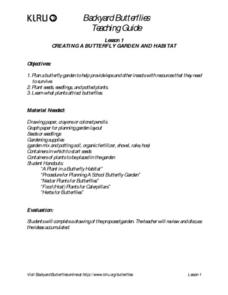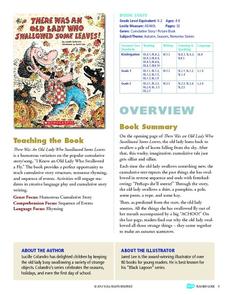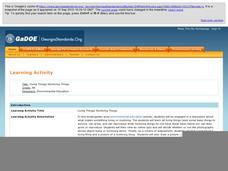PricewaterhouseCoopers
Conservation: Water
Here is a fantastic experiment-based lesson plan on water conservation, waste, and filtration. The lesson plan is well-developed and provides background information, discussion leads, and six scripted lab activities anyone can do. The...
SeaWorld
Animal Migrations
Here is a fabulous set of activities for your young scientists. Each lesson contains map, hands-on, and game activities that will help the class understand why and how animals migrate from one place to another. First they'll examine the...
Curated OER
Daily Lesson Plan for a Struggling Reader
Strategy-based programs that are executed with consistency are the best for achieving growth in any learner with a learning disability. Here is a seven-step lesson plan that is highly structured and is intended to help learners with...
Baylor College
Heart and Lungs
With a partner, youngsters measure their pulse and breathing rates, both at rest and after running in place for a minute. While this activity is not novel, the lesson plan includes a large-scale classroom graphing activity and other...
Baylor College
Dust Catchers
In class, your emerging environmentalists construct dust catchers. They take them home for a week or two, and then bring them back into class to examine under a magnifier. From this activity, they learn what makes up dust and that...
Baylor College
Food Webs
Explore various ecosystems from around the world as your class discovers the interdependence of all living things. Using the provided sets of ecosystem cards, young scientists work in small groups building food webs to demonstrate the...
Baylor College
There's Something in the Air
Clever! In order to compare indoor and outdoor dispersal rates for the movement of gases and particles through air, collaborators will participate in a classroom experiment. Set up a circular grid and set students on lines that are...
Baylor College
What Makes Water Special?
Get close up and personal with a drop of water to discover how the polarity of its molecules affect its behavior. Elementary hydrologists split and combine water droplets, and also compare them to drops of oil. Much neater than placing a...
Baylor College
What Dissolves in Water?
One of water's claims to fame is as the universal solvent. Young physical scientists experiment to discover which materials dissolve in this special compound. You could never be more prepared for teaching this lesson than by using this...
PBS
Creating a Butterfly Garden and Habitat
This complete set of instructions for creating your very own butterfly garden and habitat is so cool! With some seeds and the handy resources in this activity, you and your class will be able to determine which type of habitat is best...
Curated OER
Symmetry of the Addition Table
Help your class discover the commutative property of addition with this exploration of the addition table. By folding and coloring the table, a symmetry is found that directs students to an understanding of this crucial mathematical...
Curated OER
Halves, Thirds, and Sixths
An excellent activity that effectively pulls together the concepts of area, fractions, and equivalent fractions! Using 3x2 rectangular arrays, 3rd graders are introduced to the concept of area in terms of square units. Building on this...
Curated OER
The Square Counting Shortcut
An excellent lesson that encourages students to discover how complex figures can be broken into simpler shapes when measuring area. Working with block letters, learners are given the freedom to develop their own strategies for...
Curated OER
A Whale of Importance to the Arctic People
The bowhead whale of the Arctic region is of great importance to the people that live there. Your class will brainstorm all they know about this wonderful whale and create an informational video, which they will share with the children...
Curated OER
Who Would Win? Killer Whale vs. Great White Shark Storia Teaching Guide
Teacher guides are wonderful tools with tons of ideas that help you relate content in many different ways. Using the high-interest book, Who Would Win? Killer Whale vs. Great White Shark, learners hone their discussion and reading...
Scholastic
The Class Election from the Black Lagoon Storia Teaching Guide
One of my favorite things about this resource is that they use a standardized lexile to help you determine who should be reading what book. I also love this great teacher's guide for the book, The Class Election from the Black Lagoon. In...
Curated OER
There Was An Old Lady Who Swallowed Some Leaves Storia Teaching Guide
There was an old lady who swallowed some leaves? Little learners read a new version of the old swallow story with a fall twist as they try to answer the big question; Why is that lady swallowing all that weird stuff? The teacher's guide...
Curated OER
My First Biography: Christopher Columbus Storia Teaching Guide | Scholastic.com
Sail with Christopher Columbus on a biographical reading adventure. Young explorers learn about the life of Sir Columbus as they hone their comprehension skills through guiding questions, shared reading, and fluency practice. Included in...
National Geographic
Deep Sea Ecosystems: Extreme Living
Get deep with your elementary ecologists by introducing them to an extreme environment, the abyss. With a short video clip, a game that matches description cards to high-quality images projected on a screen, and a class discussion,...
National Geographic
Sorting the Gulf Ecosystem
A dazzling drawing of the coastal and marine ecosystems in the Gulf of Mexico is the centerpiece of this lesson. Display it for your class to view, and have them identify which organisms are plants, invertebrates, fish, birds, reptiles,...
Georgia Department of Education
Native Americans in Georgia History
Let your learners find out firsthand what hunting and gathering was really like, with a role-play activity they will remember for years. The class researches how indigenous people used plants and animals to survive while respecting and...
Georgia Department of Education
Living Things/ Nonliving Things
How can you tell if something is living or nonliving? Introduce a set of criteria which can be used to determine which things are alive and which are not. The class discusses the basic needs of all living organisms, checks out an...
Perkins School for the Blind
Creating a 3-D Model of a Plant Life
Instructing blind or visually impaired learners means you need to make symbolic tactile representations of various processes to provide as much input as possible. But wouldn't it be even better to have your learners make the models...
Perkins School for the Blind
Find the Objects/Beginning Sound Indentification
If you are just starting out as a teacher for children with visual impairments and want a fun way to teach braille and phonemic awareness, look no further. You'll fill 21 boxes with objects that start with specific letter sounds. You'll...

























